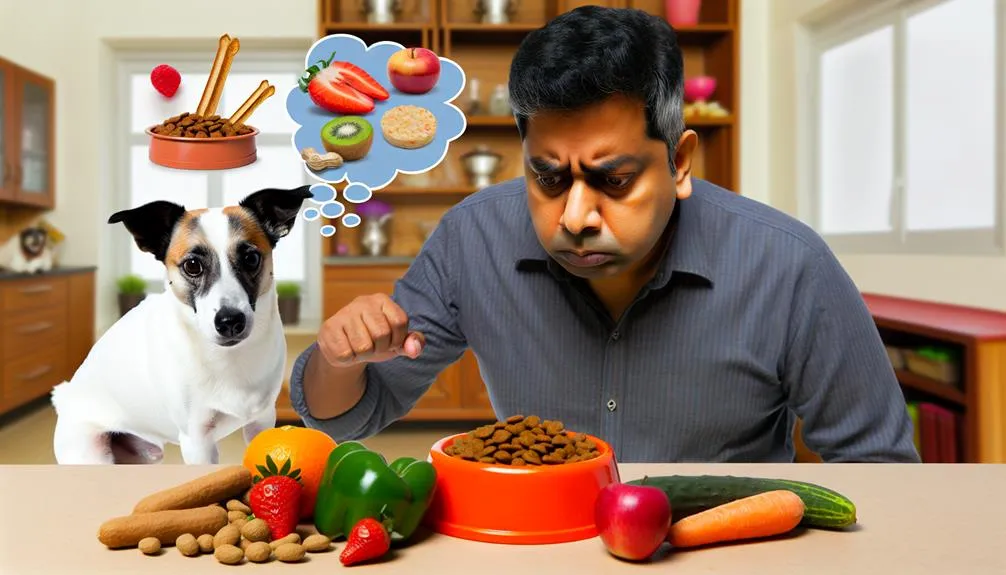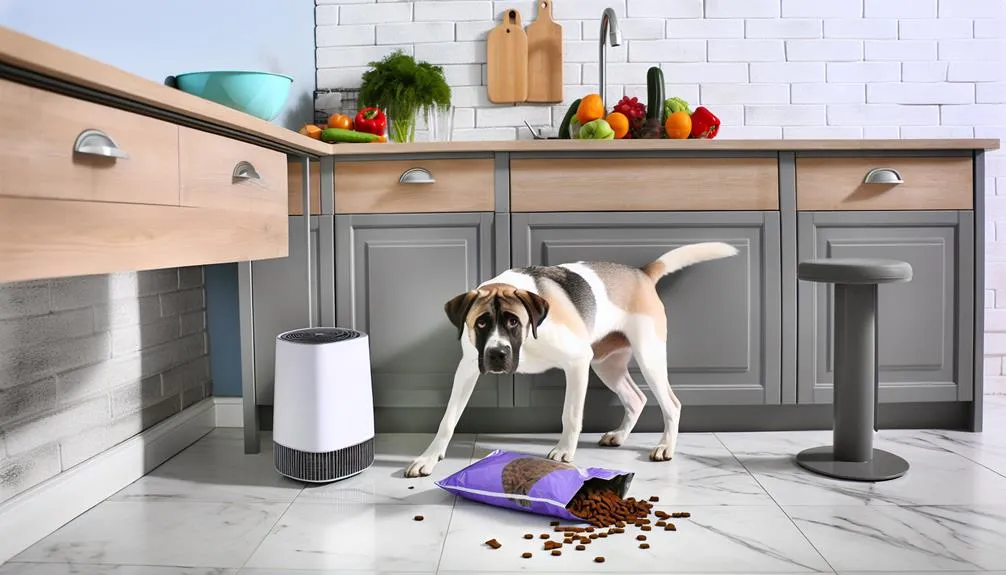
Why Is My Dog Farting so Much
If you've noticed your dog farting more than usual, you're likely wondering what's going on. There are several factors that could contribute to this rather unpleasant behavior, ranging from dietary choices to genetic predispositions. It's not just a matter of bad luck; understanding the root cause can greatly improve your dog's comfort and well-being. So, before you dismiss it as simply a quirky trait, consider the various elements that might be at play. You might be surprised by what you find out about your pet's habits and health.
Common Causes of Flatulence

Flatulence in dogs can be a perplexing issue for pet owners, but understanding its common causes can help you tackle the problem effectively. One factor to take into account is that certain breeds have a predisposition to gastrointestinal issues, which can lead to increased gas production. Breeds like Bulldogs, Pugs, and Boxers often experience flatulence due to their unique anatomy and digestive systems. Their short snouts can cause them to swallow air while eating or drinking, contributing to gas buildup.
Another important aspect to bear in mind is your dog's gastrointestinal health. If your pup has an underlying issue, such as food intolerances, allergies, or infections, it can greatly affect their digestion and lead to excessive gas. Monitoring your dog's overall gut health is essential; signs of gastrointestinal distress may include bloating, diarrhea, or changes in appetite.
Moreover, stress or anxiety can also play a role in your dog's flatulence. Just like humans, dogs can experience nervousness, which may disrupt their digestive processes and result in increased gas. Ensuring a calm environment and providing adequate mental stimulation can help alleviate some of this anxiety.
Dietary Factors to Consider
When it comes to your dog's flatulence, the ingredients in their food can play a significant role. Certain foods may be harder for your pup to digest, leading to excessive gas. Additionally, how often and when you feed them can also impact their digestive health, so it's worth considering these factors.
Food Ingredients Impact
Many dog owners may not realize that specific food ingredients can greatly impact their furry friend's gas production. The type of food you choose can play a significant role in how much gas your dog produces. For instance, high-fiber diets can lead to increased flatulence. While fiber is crucial for healthy digestion, too much of it can overwhelm your dog's digestive system, causing gas buildup.
Additionally, the presence of certain ingredients, such as beans or lentils, can contribute to excessive gas. These foods are high in complex carbohydrates that are hard for dogs to digest without sufficient digestive enzymes. When these enzymes are lacking, undigested food ferments in the intestines, leading to gas.
Moreover, artificial additives or fillers, often found in low-quality dog foods, can also upset your dog's stomach, causing bloating and flatulence. It's important to read ingredient labels carefully and consider your dog's specific dietary needs. By making informed choices about the food you provide, you can help minimize your dog's gas issues and promote a healthier gut. So, pay attention to those ingredients—your nose will thank you!
Feeding Schedule Effects
A consistent feeding schedule can greatly influence your dog's digestive health and gas production. When you establish regular meal timing, your dog's digestive system can adapt, leading to a more efficient breakdown of food. This can help reduce the amount of gas produced during digestion.
In addition to meal timing, portion control is essential. Overfeeding can overwhelm your dog's digestive system, causing it to ferment food improperly, which often results in excessive gas. It's vital to follow the feeding guidelines on your dog's food packaging and adjust portions based on their weight, activity level, and overall health.
Try to feed your dog at the same times each day. This not only helps with digestion but can also aid in behavioral training and overall routine. If you notice your dog is still farting frequently despite a consistent schedule and proper portions, you might want to take into account consulting your vet. They can determine if any underlying health issues or dietary sensitivities might be at play. By focusing on meal timing and portion control, you can help your furry friend enjoy a happier, less gassy life.
Food Allergies and Sensitivities

If your dog's farting is persistent, it might be a sign of food allergies or sensitivities. Common allergens like beef, chicken, and dairy can lead to uncomfortable symptoms, including gas and digestive upset. Understanding these triggers and adjusting their diet can help reduce those smelly incidents considerably.
Common Food Allergens
Identifying common food allergens is crucial for understanding why your dog might be experiencing excessive gas. Food allergies can lead to discomfort and digestive issues, including flatulence. To help you pinpoint potential triggers, here's a quick overview of common allergens:
| Common Allergen | Source | Symptoms |
|---|---|---|
| Beef | Animal protein | Gas, itching, diarrhea |
| Dairy | Milk products | Gas, vomiting, itching |
| Wheat | Grains | Gas, bloating, diarrhea |
If you suspect your dog has food allergies, consider starting an elimination diet. This involves removing potential allergens from your dog's diet for a few weeks and then gradually reintroducing them to observe any reactions. By tracking their response, you can identify which common allergens may be causing the issue. It's important to consult with your veterinarian before making significant changes to your dog's diet. They can guide you through the elimination diet process and guarantee your furry friend gets the nutrients they need while addressing their gas problem effectively.
Symptoms of Sensitivities
Dogs can be quite expressive when it comes to their discomfort, and symptoms of food allergies and sensitivities often manifest in various ways. You might notice gastrointestinal issues such as excessive gas, bloating, or diarrhea, which can all stem from problems with dog digestion. These symptoms can be alarming, especially if they persist.
In addition to digestive troubles, you may see skin irritations or itching, which can indicate an allergic reaction. It's important to pay attention to these signs, as they can help identify potential food sensitivities. Some breeds are predisposed to certain food allergies, so knowing your dog's breed can provide valuable insights into their specific dietary needs.
If your dog frequently experiences these symptoms, it may be time to evaluate their diet. An elimination trial can help determine which ingredients might be causing the issue. Keeping a close eye on your dog's reactions to different foods will aid in understanding their sensitivities better. By observing changes in their behavior and health, you can take steps to improve their overall well-being and comfort.
Dietary Adjustment Strategies
Understanding your dog's dietary needs is crucial for managing food allergies and sensitivities effectively. If you've noticed excessive farting, it might be linked to what your dog eats. Start by eliminating common allergens like wheat, soy, and dairy from their diet. Shifting to a hypoallergenic dog food can help identify triggers.
Incorporating fiber adjustments is another key strategy. Adding pumpkin or sweet potatoes can improve digestion and minimize gas. Just be sure to introduce these changes gradually to avoid upsetting your dog's stomach.
Probiotic supplements can also play a significant role in promoting gut health. These beneficial bacteria help balance your dog's digestive system, reducing gas and bloating. Consult your vet for recommendations on suitable probiotics tailored to your dog's needs.
Keep track of any dietary changes and your dog's reactions to them. It's important to monitor their overall health and well-being during this process. With patience and careful adjustments, you can help your dog feel more comfortable and reduce those pesky farts, making life more pleasant for both of you.
Eating Habits and Behavior
Your furry friend's eating habits can greatly impact their digestive health, and that includes the occasional bout of flatulence. When dogs indulge in excessive snacking or eat too quickly, it can lead to an upset stomach and increased gas production. Dogs often don't know when to stop, especially if they're treated with table scraps or given too many treats. This excess food can ferment in their intestines, resulting in that embarrassing fart you hear.
Mealtime distractions can also play a significant role in how your dog eats. If your pup is distracted by noise, other pets, or even your movements while they eat, they might not focus on their food properly. This can lead to gulping their meals, which increases the amount of air they swallow. Air in the digestive tract is a primary culprit behind gas and flatulence.
To help reduce these issues, consider establishing a consistent feeding routine. Feed your dog in a quiet space where they can focus on their meal without distractions. You might also try using puzzle feeders or slow-feed bowls to encourage your dog to eat slower. Additionally, monitor their snacks and guarantee they're getting the right portion sizes. By paying attention to your dog's eating habits and behaviors, you can make effective changes that promote better digestion and ultimately reduce those unwanted farts. Remember, a little adjustment in their routine can make a big difference in their overall comfort!
Health Conditions to Watch

Flatulence in dogs can sometimes signal underlying health conditions that merit attention. While occasional gas isn't usually a cause for concern, you should be aware of certain signs that may indicate a more serious issue. Health conditions like intestinal parasites and gastrointestinal infections can lead to increased flatulence and should be monitored closely.
Here's a quick reference table to help you identify potential health concerns related to your dog's flatulence:
| Condition | Symptoms | Action Required |
|---|---|---|
| Intestinal Parasites | Diarrhea, weight loss, bloating | Consult a vet for testing |
| Gastrointestinal Infections | Vomiting, loss of appetite, lethargy | Seek veterinary advice |
| Food Intolerances | Excessive gas, itching, diarrhea | Evaluate diet, consult vet |
| Pancreatitis | Abdominal pain, vomiting, diarrhea | Immediate vet visit needed |
If your dog's flatulence is accompanied by any of these symptoms, it might be time to investigate further. Intestinal parasites, for instance, can be easily treated but can lead to more serious health issues if left untreated. Gastrointestinal infections can also disrupt your dog's digestive system, causing discomfort and excess gas.
Being proactive about these signs can help guarantee your furry friend stays healthy and happy. Always keep an eye on changes in your dog's behavior, as they can be the first indicators that something's not quite right.
When to See a Vet
Recognizing when to seek veterinary care for your dog can be essential for their health. If your furry friend's flatulence has suddenly increased or is accompanied by other concerning symptoms, it's time to contemplate a visit to the vet. While occasional gas is normal, persistent or excessive farting might indicate underlying gastrointestinal disorders that require attention.
Pay close attention to any additional signs your dog might display. If you notice symptoms like vomiting, diarrhea, lethargy, or a loss of appetite, don't hesitate to contact your veterinarian. These could signal a more serious issue that needs immediate attention. Sometimes, your vet may recommend diagnostic tests to identify the root cause of your dog's discomfort. These tests can include blood work, fecal exams, or even imaging studies, all designed to give a clearer picture of your dog's digestive health.
It's also worth mentioning that age plays a role in how you should approach these situations. Older dogs are more susceptible to gastrointestinal disorders, so if your senior dog is experiencing increased gas, it's particularly important to consult your vet promptly. Remember, addressing any concerns early can lead to better outcomes and help maintain your dog's overall well-being.
Tips for Reducing Flatulence

While occasional gas is a normal part of a dog's digestive process, there are effective strategies you can implement to help reduce flatulence. First, review your dog's diet. Some foods, particularly those high in fiber or fat, can contribute to excessive gas. Consider switching to a high-quality, easily digestible dog food that's specially formulated to minimize flatulence.
Next, monitor your dog's eating habits. If your dog tends to gulp down food, it can swallow air, leading to gas. Try using a slow feeder bowl to help them eat more slowly and chew their food thoroughly.
Regular exercise routines are also essential. Keeping your dog active not only aids digestion but can also reduce stress, which can be a contributor to gas. Aim for daily walks, play sessions, or any activity that gets your dog moving and engaged.
Speaking of stress, managing your dog's anxiety can play an important role in reducing flatulence. If your dog experiences stress during specific situations, like loud noises or changes in routine, consider implementing calming techniques. This might include creating a safe space for your dog or using anxiety-reducing products like calming collars or pheromone diffusers.
Frequently Asked Questions
Can Certain Dog Breeds Fart More Than Others?
Certain dog breeds can indeed fart more than others due to breed differences in digestive health. Breeds with shorter snouts often swallow more air, leading to increased gas. It's crucial to monitor their diet and digestion.
Is It Normal for Puppies to Fart Frequently?
Did you know that around 30% of puppies experience gas due to their developing digestive health? A balanced puppy diet can help reduce farting, but it's normal for them to pass gas more frequently.
Do Dog Probiotics Help Reduce Flatulence?
Dog probiotics can help reduce flatulence by improving digestive health. Various probiotic types, like Lactobacillus and Bifidobacterium, support gut balance, potentially leading to less gas and a happier pup overall. It's worth considering for your furry friend!
Can Stress Cause My Dog to Fart Excessively?
Yes, stress factors can definitely affect your dog's digestive health. When stressed, your dog might experience increased flatulence due to disrupted digestion. Keep an eye on their environment to help reduce stress and improve their comfort.
Are There Any Home Remedies for Dog Flatulence?
If you're looking for home remedies for dog flatulence, consider diet changes like incorporating probiotics or pumpkin. These can improve digestive health, reducing gas and keeping your furry friend comfortable and happy.
Conclusion
If your dog's excessive flatulence is driving you crazy, don't worry—you're not alone! While it can be frustrating, understanding the causes and making simple adjustments can greatly reduce the toots. Remember, it's not always about what they eat; their eating habits and overall health play a big role, too. If you've tried changes but nothing seems to work, don't hesitate to consult your vet. A happier, less gassy pup is just a few tweaks away!
You may also like
Archives
Calendar
| M | T | W | T | F | S | S |
|---|---|---|---|---|---|---|
| 1 | 2 | 3 | 4 | 5 | 6 | |
| 7 | 8 | 9 | 10 | 11 | 12 | 13 |
| 14 | 15 | 16 | 17 | 18 | 19 | 20 |
| 21 | 22 | 23 | 24 | 25 | 26 | 27 |
| 28 | 29 | 30 | ||||
Leave a Reply